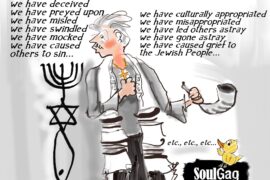Being authentic takes guts.
The bravest thing one can do is own their story. In today’s world, it is so easy to get lost in the status quo. The world is more connected than ever, and everything is excessive and in your face all the time. The system is set up to confuse you into comparing yourself to others instead of fostering the tenacity of individuality and diversity.
“The immune system, our sensitivity to foreign matter, can be understood on a broader spiritual plane to refer to our innate sense of self and non-self. We are at home with ourselves, with that which we perceive to be part of us. We naturally recoil from what we sense to be non-self, some type of foreign invasion, be it on a biological level in the form of a disease or on a psychological level in the sense of strange and undesired influences.” -Rav Yitzḥak Ginsburg
Physiology teaches us that in autoimmune disease, the body first misinterprets the invading unhealthy matter to be healthy, and only then begins to fight against its healthy cells as if they were foreign invaders. Which ends up attacking the root of the body’s defense mechanism, making it unable to tell the difference between healthy and unhealthy elements. The immune system may then experience such internal confusion that it actually perceives the person’s healthy body as the threat. The body then produces antibodies to fight against healthy cells and organs.
“Woe unto them that call evil good and good evil; that put darkness for light and light for darkness; that put bitter for sweet and sweet for bitter!.” –Yishayahu 5:20
Dysfunctional psychological confusion has a physiological parallel to the illness of the immune system. A problem of the immune system is a problem related to the defense mechanism of the body.
According to the Kabbalists, the “misunderstanding” of the immune system can be understood in the lessons of the s’fira of hod.
Hod – which can be translated as “acknowledgment” – can also be understood as the thinking mind. The thinking mind (hod) is committed to acknowledging the commitment to ideals and thoughts people unconsciously subscribe to.
A healthy hod (thinking mind) is powered by truth and goodness, which surpasses our normal realm of thinking and allows someone to reflect from the deepest intuitive sense of the soul what is ultimately true and good. When hod is spelled backward, it reads as davah, which means “to be ill.”
The mystics explain that during the time of exile, dysfunction is prominent which causes confusion, the illness of davah.
Psychological defense mechanisms can help us through tough times, but they can become problematic when applied too often and for long periods of time. Defense mechanisms have the power to keep you captive in vicious cycles causing confusion and ultimately depleting your sense of self. Some examples of common defense mechanisms are projection, rationalization, intellectualization, repression, and reaction.
Carl Jung says: “The first half of life is devoted to forming a healthy ego, the second half is going inward and letting go of it.”
Rectifying the ego and being honest with oneself is one’s best chance of refining negative thoughts and feelings that destroy our self-worth and avodat HaShem.
My favorite method for challenging stale, unproductive, and even harmful thoughts and feelings is extracted from Experiential therapy. The goal of Symbolic-Experiential therapy is to unblock honest emotional expression in individuals and families, to their inner experience, and help them be more fully human.
From here, we can take a lesson from Carl Whitaker, a pioneer of the Symbolic-Experiential model.
Whitaker used the concept of absurdity several times in his theory. The goal was for each person involved in therapy to establish a relationship with their own absurdities without restriction through emotional means. Whitaker would use his own absurdity and authentic style to push movement within the therapeutic goal.
“The absurdity was used to divide the problematic situations of communication, change the interaction and perception of the therapeutic process, support and open the reasoned ‘observer’ role of the right hemisphere of the brain, and overcome therapeutic deadlock and blockage.” (Watzlawick, 1974 as cited in Cullin, 2008)
This model and style of thinking can be understood as strengthening one’s thinking mind (hod) by battling the davah – “the illness” of confusion by being just as absurd. Part of my therapeutic style is drawing from the therapy of the absurd paired with play therapy for adults. Whether it involves hypothetical examples that use imagination, role reversal activities, guided meditations, doing handstands, somatic movement, storytelling, or creating meaningful rituals, etc… I am sure outsiders will view this as absurd!
Whitaker himself said that play therapy is a very important partner to family therapy. In that case, it becomes a compliment to be thought of or spoken about as absurd by an untrained on-looker. Within this sacred place, we can explore thoughts and feelings that are often labeled as wrong, difficult, or negative.
It is part of the human condition to possess negative qualities. It is natural to have negative thoughts, but it is maturity that helps us utilize those thoughts to work on and rectify our negative qualities. However, this can become distressing and challenging for many people, so they use various defense mechanisms to block this type of healing work. When this happens we lose an important opportunity for true self-awareness.
To get to a higher degree of self-awareness one must understand that having negative qualities does not say anything bad about you – certainly not the real you at your soul level. What makes this even harder is that the outside forces at large, influenced by the exile mentality, will tell you that your bad qualities mean that you are bad.
Personal growth requires self-awareness.
Rav Wolbe teaches that initially thinking about our positive qualities is harder than focusing on our faults. When we feel stuck in our spiritual and moral development, we explain away the rut we are in by faulting ourselves. A person might ask, for example, “What is wrong with me?”
But it also serves as the justification and excuse for why we will likely stay stuck. In a way, this feels good, because if we stood no chance of succeeding in the first place, we cannot say we “failed.”
On the other hand, by taking stock of our assets, we show ourselves that we have the potential to succeed.
One of the most beautiful parts of being human is finding your unique place in the collective radiating whole. The real you is capable of tolerating short-term difficulties for long-term growth. The ability to self-soothe and self-validate is the vehicle to personal freedom. The exile mentality is strengthened by frustration, despair, and hopelessness. Personal freedom needs self-awareness for someone to find their path according to their authentic nature.
“An enduring Shalom can come only come when every person and every community finds its place and appreciates where it fits in the whole. Jews must be able to be themselves and appreciate others. They should be able to find their place within a community without having to disparage any other community.” (Lynn. Y Cohen .J Nurture Their Nature The Torah’s Essential Guidance for Parents and Teachers pg.55-56)
The nature of exile sets in and causes a heavy fog of confusion and davah. According to Yishayahu, we need to be wary of evil-looking good and good-looking evil. At this point, the concept of the Therapy of the Absurd becomes restorative. The humility and ḥutzpah it takes to be honest with ourselves are worth a standing ovation. To devote yourself to creating a strong root system for personal freedom, despite overwhelming confusion from the outside is beyond belief.
Being conscientious in swimming against the tide of exile mentality is the catalyst to one’s strong roots of personal freedom. The nature of freedom is grounded in genuine care for humanity through a soul lens activated by ḥesed (loving-kindness), yirat shamayim (moral compass) & emet (truth).
May the sincerity of your personal growth be an activator for a healthy spiritual and physical immune system. May you be an activator for shining your unique light in the darkest of places.
May your good health be an activator for finding your unique place in Klal Yisrael.





